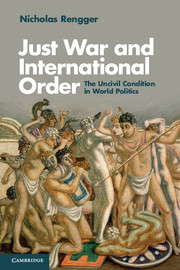5 - Supreme emergency
Published online by Cambridge University Press: 05 April 2013
Summary
Listen to what they did.
Don't listen to what they said.
What was written in blood
Has been set up in lead.
Lead tears the heart.
Lead tears the brain.
What was written in blood
Has been set up again.
The heart is a drum.
The drum has a snare.
The snare is in the blood.
The blood is in the air.
Listen to what they did.
Listen to what's to come.
Listen to the blood.
Listen to the drum.
James Fenton, ‘Blood and Lead’
In 1977, H.L.A. Hart published an essay in the Georgia Law Review. ‘The Nightmare and the Noble Dream’ essayed a characteristically brilliant interpretation of twentieth-century American legal theory suggesting that the whole body of United States jurisprudence was focused on the question of how to respond to the reality of judges striking down democratically validated legislation on constitutional grounds. One response – the nightmare – was to assert versions of a totally unconstrained indeterminacy in law, a position adopted in varying ways and to varying degrees, Hart thought, by the early twentieth-century American legal realists, by Deweyesque pragmatists and, more recently, by the critical legal studies movement. The leading alternative – the noble dream – assumed a complete legal determinacy, with resources being found within law for a consistent set of legal principles informing judges' decisions and, indeed, the law itself. Among the leading representatives of this view, Hart thought, were Roscoe Pound (and, one might add, though Hart did not, Lon Fuller), but the chief contemporary representative – and Hart's chief target in the essay – was the judicial prescriptivism of Ronald Dworkin.
- Type
- Chapter
- Information
- Just War and International OrderThe Uncivil Condition in World Politics, pp. 134 - 157Publisher: Cambridge University PressPrint publication year: 2013



